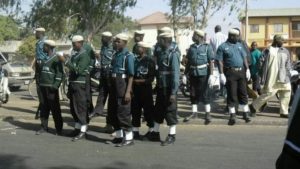
The Kano State Hisbah Board has dismantled a makeshift pilgrimage site that emerged in the Dakata Industrial Area, following widespread but unverified claims that the location bore the sacred footprint of Prophet Muhammad (Peace Be Upon Him).
The site, located in Hotoron Arewa, a suburb on the outskirts of Kano, quickly transformed into a spiritual hub after word spread that muddy water had begun seeping from markings believed by some to resemble the Prophet’s footprints. Reports indicate that hundreds of people, including the sick and hopeful have been flocking to the area daily, engaging in ritualistic practices and collecting the water in bottles, convinced of its alleged healing properties.
A now-viral video captured the intensity of the frenzy: men, women, and children jostling for a chance to scoop the murky water, pour it over themselves, and pray fervently on the spot. Many were seen prostrating and bathing in the pool, while others came with relatives afflicted by illnesses, hoping for miraculous cures.
“People with strange illnesses are also trooping to the site to bathe in the water,” a local resident told SaharaReporters under the condition of anonymity. “Entire families are relocating here. There’s a real belief that the water heals.”
However, there is no scientific or religious verification backing the claims. The spread of the story — largely fueled by social media and word-of-mouth — has raised concerns among authorities.
Reacting to the development, Deputy Commander of the Kano Hisbah Board, Muhahideen Aminudeen, confirmed the agency’s swift intervention. He described the situation as a result of ignorance and misinformation.
“Some mischief makers circulated this bogus story that the place is a holy site where the Prophet set foot,” Aminudeen stated. “Unfortunately, many people who lack sound knowledge of Islam were misled. We deployed officers to the scene to educate the people and dismantle the site to prevent further harm.”
The Hisbah Board, known for enforcing Sharia law and Islamic moral standards in the state, emphasized the need for vigilance and proper religious education to prevent the spread of such unfounded beliefs. Officers have since cleared the area, urging the public to avoid engaging in practices not rooted in authentic Islamic teachings.
As the dust settles in Hotoron Arewa, questions linger about the power of viral narratives, the desperation of the ill, and the thin line between faith and folklore in a deeply spiritual society.
